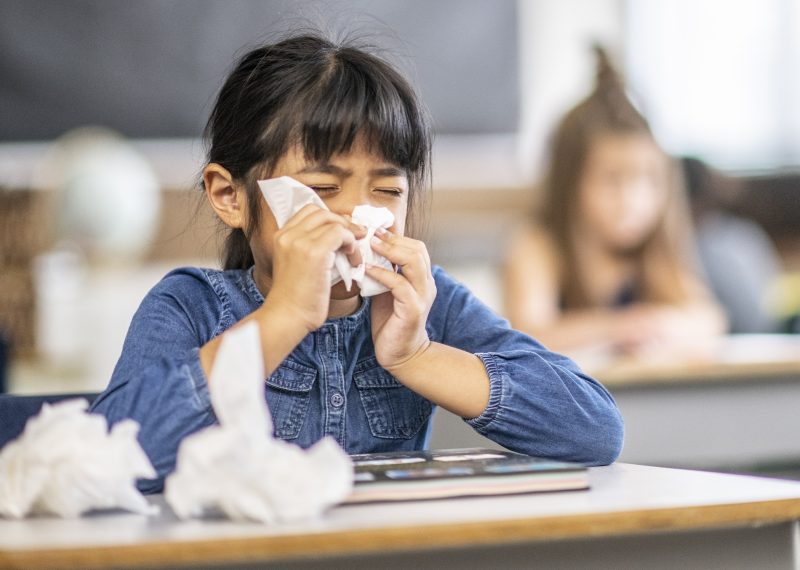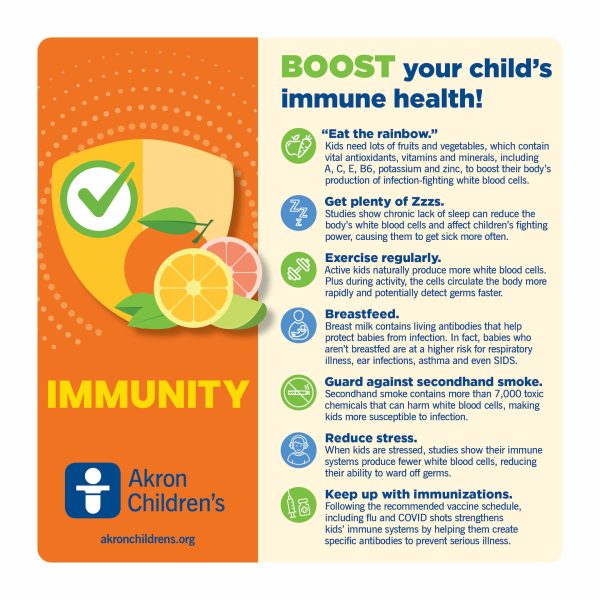 Back to school seems to be synonymous with repeat infections. During the school year, you might find that your child keeps coming home with a runny nose, cough or the newest virus that’s been circulating. This can be especially stressful if your child has just started preschool or day care.
Back to school seems to be synonymous with repeat infections. During the school year, you might find that your child keeps coming home with a runny nose, cough or the newest virus that’s been circulating. This can be especially stressful if your child has just started preschool or day care.
You may be left wondering: Is it normal for my child to get sick so often?
“Young children, especially those who are starting school or day care, are being exposed to new environments and new germs, which increase their chances of getting sick,” said Dipti Sekhsaria, MD, a pediatrician at Akron Children’s Pediatrics, Wadsworth. “These kids also are spending a lot of time indoors in close quarters, allowing germs and viruses to spread more easily.”
It’s like a chain reaction. If your child has a cold and they’re in a room with other kids, one child can give it to two children and they can give it to four children and so on. This chain reaction spark can really happen at any age, from infants and toddlers to preschoolers and older kids.
It might be hard to believe, but young kids with normal immune function can have up to 12 viral infections a year with each viral infection lasting up to 2 weeks. Do the math, and that means kids could be sick almost half the year!
“For younger kids, especially those in daycare settings, their immune system is still developing, and they tend to explore their world with their hands and mouth, which increase the chances of catching an illness,” said Dr. Sekhsaria. “They might not always remember to cover their mouth when they cough and sneeze, which spreads even more germs.”

Properly washing your hands after going to the bathroom and before eating is important to protect against certain illnesses.
Tips to help slow the spread
Repeat infections may be common, but that doesn’t mean it’s not frustrating for both you and your child. The best way to prevent getting a virus or other illness is not to be near someone else with a virus, and that’s very difficult if your child attends any kind of school or day care.
Since that’s not realistic, Dr. Sekhsaria offered tips to help slow the spread.
Properly washing your and your child’s hands after using the bathroom and before eating is important to help protect against certain viruses like the stomach flu that spread via touch.
But, for viruses that spread through the air, like colds or flus, it can be very difficult to slow the spread. In addition to frequent hand washing, teach children to cover their coughs and sneezes with their elbows and to throw used tissues in the garbage.
Eating a balanced diet rich in fruits and vegetables, regular physical activity and good sleep habits are important to keep the immune system strong. Vaccines like the flu shot also are helpful in boosting the immune system because they train your child’s immune system to recognize these harmful germs without experiencing the actual illness.
Unfortunately, things like vitamins or zinc don’t really do much to protect your child from getting sick.
“There is no set recommendation for any particular supplements to keep an otherwise healthy child healthy,” explained Dr. Sekhsaria. “If a child is a very picky eater, skips meals consistently or doesn’t get the recommended 5 servings of fruits and veggies a day, then a multivitamin supplement might be helpful. Vitamin C helps fight infections, and the good news is that kids usually get enough of it with a balanced diet.”
While colds and viral infections are inconvenient and uncomfortable for you and your child, they aren’t a danger to your child’s health. In fact, on the contrary: Part of childhood is being exposed to illnesses and developing the immune response to provide protection as we age.
“Our immune systems are uniquely designed to identify and respond to new infections and exposures, and when kids are constantly exposed to new germs, it builds antibodies, which help in fighting common viral and bacterial infections,” said Dr. Sekhsaria. “It’s reassuring news because you really can’t stop these viruses from flowing.”
If your child is sick and you’re concerned, contact one of our pediatricians for advice. If you’re worried about a high temperature, here’s what you need to know about treating fevers. Also, get tips on how to distinguish between colds, flu and COVID.











